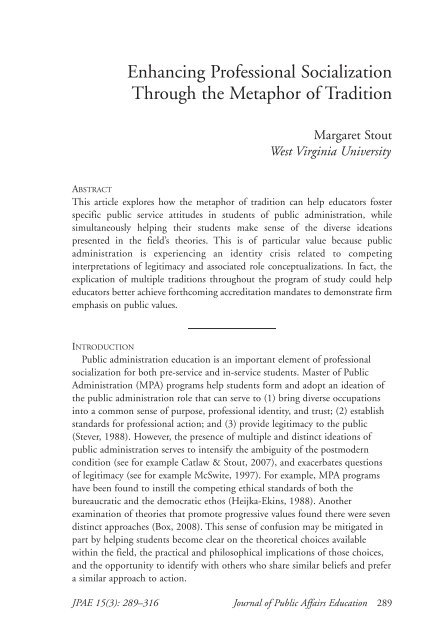JOURNAL OF PUBLIC AFFAIRS EDUCATION - naspaa
JOURNAL OF PUBLIC AFFAIRS EDUCATION - naspaa
JOURNAL OF PUBLIC AFFAIRS EDUCATION - naspaa
Create successful ePaper yourself
Turn your PDF publications into a flip-book with our unique Google optimized e-Paper software.
Enhancing Professional Socialization<br />
Through the Metaphor of Tradition<br />
Margaret Stout<br />
West Virginia University<br />
ABSTRACT<br />
This article explores how the metaphor of tradition can help educators foster<br />
specific public service attitudes in students of public administration, while<br />
simultaneously helping their students make sense of the diverse ideations<br />
presented in the field’s theories. This is of particular value because public<br />
administration is experiencing an identity crisis related to competing<br />
interpretations of legitimacy and associated role conceptualizations. In fact, the<br />
explication of multiple traditions throughout the program of study could help<br />
educators better achieve forthcoming accreditation mandates to demonstrate firm<br />
emphasis on public values.<br />
INTRODUCTION<br />
Public administration education is an important element of professional<br />
socialization for both pre-service and in-service students. Master of Public<br />
Administration (MPA) programs help students form and adopt an ideation of<br />
the public administration role that can serve to (1) bring diverse occupations<br />
into a common sense of purpose, professional identity, and trust; (2) establish<br />
standards for professional action; and (3) provide legitimacy to the public<br />
(Stever, 1988). However, the presence of multiple and distinct ideations of<br />
public administration serves to intensify the ambiguity of the postmodern<br />
condition (see for example Catlaw & Stout, 2007), and exacerbates questions<br />
of legitimacy (see for example McSwite, 1997). For example, MPA programs<br />
have been found to instill the competing ethical standards of both the<br />
bureaucratic and the democratic ethos (Heijka-Ekins, 1988). Another<br />
examination of theories that promote progressive values found there were seven<br />
distinct approaches (Box, 2008). This sense of confusion may be mitigated in<br />
part by helping students become clear on the theoretical choices available<br />
within the field, the practical and philosophical implications of those choices,<br />
and the opportunity to identify with others who share similar beliefs and prefer<br />
a similar approach to action.<br />
JPAE 15(3): 289–316 Journal of Public Affairs Education 289
















